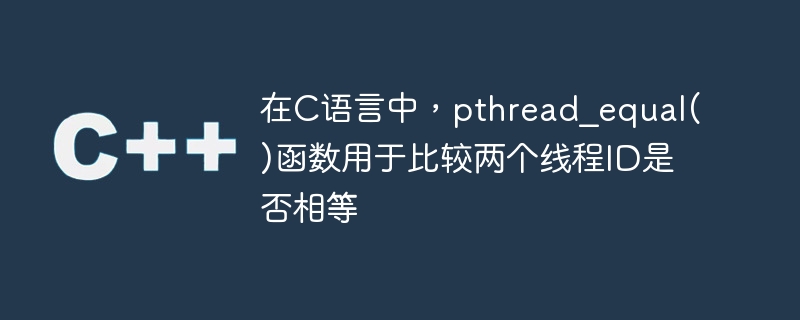
pthread_equal()函數用來檢查兩個執行緒是否相等。它傳回0或非零值。對於相等的線程,它將傳回非零值,否則傳回0。函數的語法如下:
int pthread_equal (pthread_t th1, pthread_t th2);
現在讓我們來看看 pthread_equal() 的實際作用。第一種情況,我們會檢查自線程來檢查結果。
#include <stdio.h>
#include <stdlib.h>
#include <unistd.h>
#include <sys/types.h>
#include <pthread.h>
pthread_t sample_thread;
void* my_thread_function(void* p) {
if (pthread_equal(sample_thread, pthread_self())) { //pthread_self will return current thread id
printf("Threads are equal</p><p>");
} else {
printf("Threads are not equal</p><p>");
}
}
main() {
pthread_t th1;
sample_thread = th1; //assign the thread th1 to another thread object
pthread_create(&th1, NULL, my_thread_function, NULL); //create a thread using my thread function
pthread_join(th1, NULL); //wait for joining the thread with the main thread
}Threads are equal
現在,如果我們在兩個不同的執行緒之間進行比較,我們將看到結果。
#include <stdio.h>
#include <stdlib.h>
#include <unistd.h>
#include <sys/types.h>
#include <pthread.h>
pthread_t sample_thread;
void* my_thread_function1(void* ptr) {
sample_thread = pthread_self(); //assign the id of the thread 1
}
void* my_thread_function2(void* p) {
if (pthread_equal(sample_thread, pthread_self())) { //pthread_self will return current thread id
printf("Threads are equal</p><p>");
} else {
printf("Threads are not equal</p><p>");
}
}
main() {
pthread_t th1, th2;
pthread_create(&th1, NULL, my_thread_function1, NULL); //create a thread using my_thread_function1
pthread_create(&th1, NULL, my_thread_function2, NULL); //create a thread using my_thread_function2
pthread_join(th1, NULL); //wait for joining the thread with the main thread
pthread_join(th2, NULL);
}Threads are not equal
以上是在C語言中,pthread_equal()函數用來比較兩個執行緒ID是否相等的詳細內容。更多資訊請關注PHP中文網其他相關文章!




